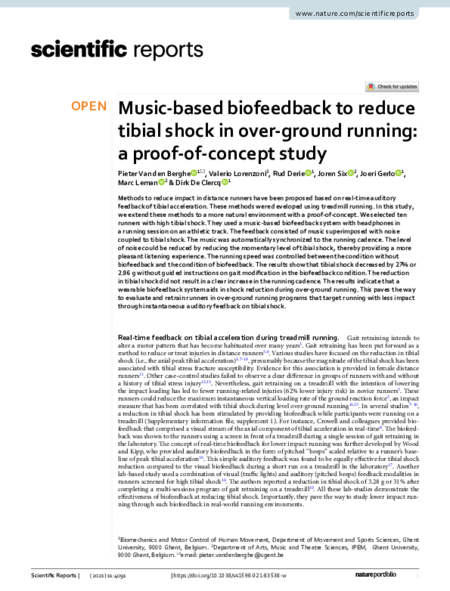~ Music-based biofeedback to reduce tibial shock in over-ground running: a proof-of-concept study
» By Joren on Thursday 18 February 2021For the last couple of years there has been a fruitful collaboration ongoing between the systematic musicology (IPEM) and sports-science departments at Ghent University. IPEM has a rich history of fundamental research on the link between movement and music. In a newly published proof-of-concept study the music-movement link improves running style. The runner is equipped with a musical biofeedback system to lower foot-impact. For more details, see:
Music-based biofeedback to reduce tibial shock in over-ground running: a proof-of-concept study, published in Scientific Reports(2021) by Van den Berghe, P., Lorenzoni, V., Derie, R. et al.
Abstract Methods to reduce impact in distance runners have been proposed based on real-time auditory feedback of tibial acceleration. These methods were developed using treadmill running. In this study, we extend these methods to a more natural environment with a proof-of-concept. We selected ten runners with high tibial shock. They used a music-based biofeedback system with headphones in a running session on an athletic track. The feedback consisted of music superimposed with noise coupled to tibial shock. The music was automatically synchronized to the running cadence. The level of noise could be reduced by reducing the momentary level of tibial shock, thereby providing a more pleasant listening experience. The running speed was controlled between the condition without biofeedback and the condition of biofeedback. The results show that tibial shock decreased by 27% or 2.96 g without guided instructions on gait modification in the biofeedback condition. The reduction in tibial shock did not result in a clear increase in the running cadence. The results indicate that a wearable biofeedback system aids in shock reduction during over-ground running. This paves the way to evaluate and retrain runners in over-ground running programs that target running with less impact through instantaneous auditory feedback on tibial shock.

